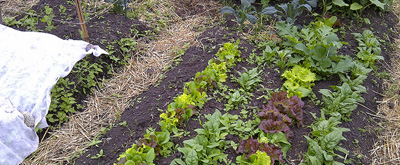 Veggie garden by M. Ewert
Veggie garden by M. Ewert Just like that, it’s fall! What a fantastic summer we had, ideal for growing tomatoes and other heat-loving crops. But now that it’s getting cooler, the time is right to switch to winter crops or get your garden tucked in for the winter so it’s ready to grow again next spring.
Harvest
Time to bring in those winter squash (did you grow pumpkins?), apples, and not-quite-ripe tomatoes and then clean all the plant debris out of your garden beds. If you end up with more than you can eat or preserve, consider sharing via Lettuce Link‘s food sharing program or taking it to your local food bank. Then, on to mulching or planting!
Grow Food Over the Winter
Plant garlic by Halloween and it’ll be ready to harvest late next summer. You can grow also greens, like lettuce, or veggies like broccoli, under plastic sheeting, floating row covers or cold frames. (One easy idea for hoop tunnel row covers here.) Fall is also the best time to plant perennials, like blueberry bushes and fruit trees – our wet fall and winter months help them get established before a long dry summer.
Leave leaves!
Leaves falling to the ground is one of the biggest signals that fall is here. Sure, you can rake them up and put in your compost or green collection bin, but leaves make great mulch, so consider leaving them in place or rake into beds to protect perennials and tender plants and provide nutrients for the soil. You may need to keep an eye out for slugs though, as they do like to hide out under leaves.
Another way to build good soil, prevent weeds and soil erosion and attract beneficial insects, is to plant cover crops (or “green manure”) now, such as red clover, purple vetch, fava beans, and cereal rye. In the spring, many of these can be spaded right into the beds, and some even provide nitrogen for the soil, so your veggies will be off to a great start.
Get Help
First up, we are lucky to have Seattle Tilth as a great local resource. From classes to plant sales to online information, you’ll find great support for your food growing and other gardening efforts.
The City also offers ways to learn more. Check out Seattle Public Utilities’ Food Gardening page that links to lots of info on natural yard care, composting and includes their Growing Food in the City guide. The guide has a handy planting calendar for many commonly grown foods and has been translated into 13 languages besides English. If you want to talk to an expert, call the Garden Hotline at (206) 633-0224 or email them at help@gardenhotline.org.
